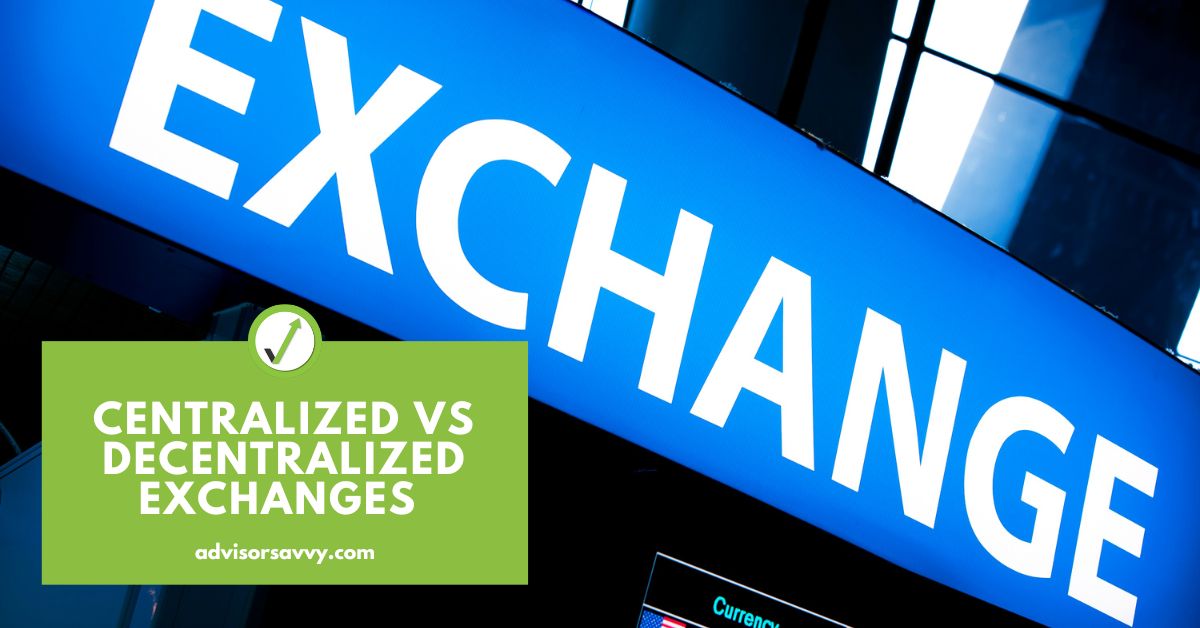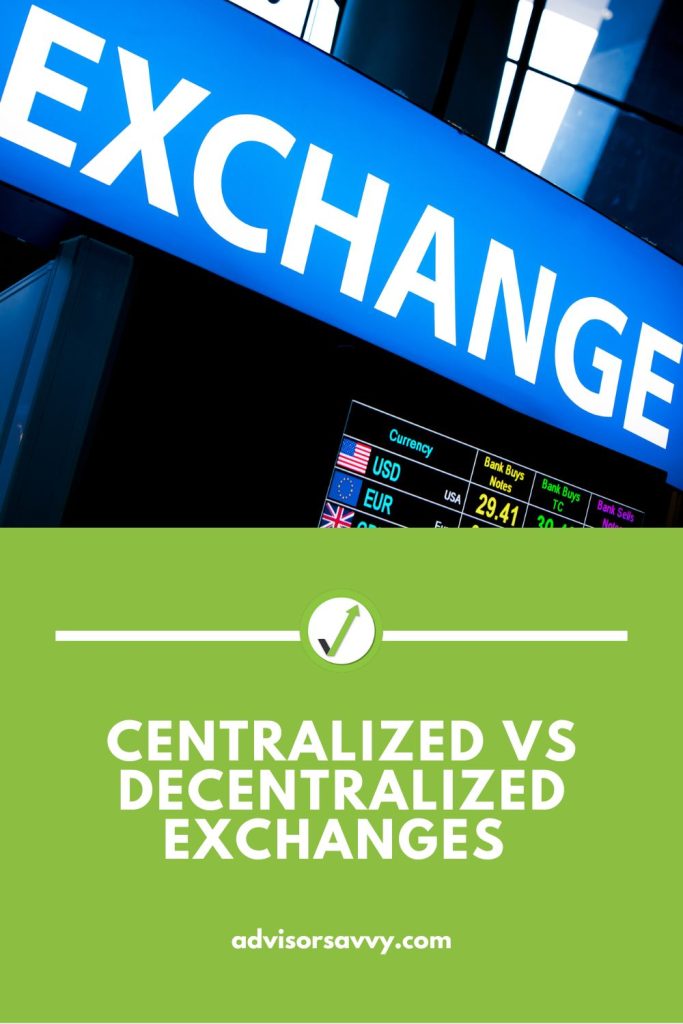
An exchange is an organized marketplace that connects buyers and sellers. Within an exchange, parties can buy and sell assets such as currency, stocks, bonds, futures and options. Exchanges can either be centralized or decentralized. But what exactly is the comparison between centralized vs decentralized exchanges? Generally speaking, most exchanges are centralized, such as the Toronto Stock Exchange (TSX). However, with the arrival of cryptocurrency in financial markets, a new concept of decentralization has come about.

Table of contents
In this post, we’ll explore the key differences between centralized and decentralized exchanges. By the end of this article, you’ll understand how both kinds of exchanges compare and contrast.
Centralization vs Decentralization: What does it mean?
Sometimes the terms centralization and decentralization describe how businesses operate. Centralization refers to companies that have one core function where all business activities flow through. On the other hand, decentralization refers to companies where various functions of the business operate autonomously and independently of one another. In many ways, exchanges are a business so these same concepts apply. Let’s take a closer look at how centralized vs decentralized applies to exchanges.
What is centralization?
In terms of stock exchanges, centralization occurs when buyers and sellers must complete their transactions through the exchange. In other words, the exchange regulates and has authority over transactions in a centralized market. For example, the Toronto Stock Exchange (TSX) is a centralized market because all transactions flow through one entity, the TSX. Let’s take a look at the pros and cons below.
Centralized exchanges: advantages & disadvantages
| Advantages | Disadvantages |
| Often more user friendly and easy to learn | You must trust the company regulating the exchange |
| Greater security and protection | Service and transaction fees apply |
| Tried and true method | Company can theoretically shut down |
On the plus side, centralized exchanges are often easy to use and organized in a way that’s user friendly. When it comes to money, a simple and understandable platform is best so you can focus on financial decision making. In addition, centralized exchanges have greater security and protection because an external entity is managing it. If you lose access to your account, you can usually regain access with the help of the centralized entity. Alternatively, if a transaction goes awry, they should ensure the correct measures are taken. Some centralized exchanges even have insurance benefits to protect your finances. Lastly, centralized markets have been in existence for a long time making it an effective platform.
On the contrary, you must trust the intermediary who is overseeing transactions between buyers and sellers. Many centralized exchanges are reputable, but you still have to be cautious. Also, service and transaction fees arise on transactions within a centralized exchange. This is because you must pay to use the services on the platform in some way. Finally, centralized exchanges are backed by a business which can theoretically shut down. Just like any other business, centralized exchanges can fail or go bankrupt. In this case, your finances may be jeopardized.
What is decentralization?
A decentralized exchange is an automated program that facilitates the buying and selling of investments. The platform is primarily controlled by a decentralized network of computers. However, a group of individuals usually oversees the development and maintenance of the platform. Cryptocurrency is famed for its application of decentralized exchanges which is often considered disruptive technology. Uniswap is currently the largest decentralized exchange in the world, as of May 2022.
Decentralized exchanges: advantages & disadvantages
| Advantages | Disadvantages |
| Anonymity, privacy and greater control | Relatively new technology |
| Asset transfers do not flow through a third party | Higher risk |
| Redistributed fees to liquidity providers | Liquidity issues |
In terms of benefits, decentralized exchanges do not require you to verify your identity to open an account. Furthermore, your account cannot be traced back to your name or identity. Many people favour this because it provides privacy and greater control over your investments and personal data. In addition, assets do not flow through a third party which some prefer to maintain anonymity. Lastly, fees still apply on a decentralized exchange, but they are redistributed to liquidity providers. A liquidity provider is a financial institution that behaves like an intermediary in a securities market. Without liquidity providers, decentralized markets would not exist. For this reason, distributing the fees back to them is seen in a positive light.
On the con side, decentralized exchanges are still very new. The technology is argued to be disruptive, but there are still many wrinkles that need to be ironed out. There is little regulation on a decentralized exchange which puts a greater burden on the user. This means you must learn the ins and outs of the platform yourself and personally address any risks you find. There is no third party to help you with this. Also, if the worst case scenario happens, you may lose all your money in the platform and have no method of repercussion. All of these things cause decentralized exchanges to be higher risk. Finally, decentralization is possible because of liquidity providers. However, there are instances where not enough liquidity providers are on the exchange which can affect your ability to conduct transactions.
Why is centralization vs decentralization relevant right now?
With technological advancement, decentralization has become possible. Prior, the concept of an automated system to regulate an exchange was unheard of. But with so much automation in other areas of the economy, it has disrupted the application of technology in the financial sector as well. Because of this, the debate of centralized vs decentralized exchanges has become a hot topic.
In recent years, there has been a growing debate over the merits of centralization vs decentralization. Proponents of decentralization argue that it results in more efficient decision-making and allows for greater innovation. However, opponents of decentralization point to the increased risk of corruption and the difficulty of coordinating a decentralized system. The recent rise of disruptive technologies has led many to reconsider the role of centralization. With the invention of blockchain technology, for example, it is now possible to create decentralized systems that are resistant to corruption and fraud. Supporters of decentralization believe these markets will eventually outperform their centralized counterparts. As more businesses and organizations begin to explore the potential of these new technologies, the debate over centralization vs decentralization is likely to intensify.
Centralized vs decentralized exchanges: Crypto
Cryptocurrency is a digital or virtual currency that uses cryptography for security. A key feature of cryptocurrency is that it is decentralized, meaning it is not subject to government or financial institution control. In fact, crypto is the very thing that sparked widespread interest in decentralized exchanges. This decentralization is one of the main attractions of cryptocurrency, as it allows for secure peer-to-peer transactions without the need for intermediaries. However, this decentralization also means there is no central authority to protect investors from fraud or mismanagement. The onus is primarily on the individual to protect themselves. Fortunately, there are centralized cryptocurrency markets which can provide more security to the user.
As a result of issues with decentralization, many people have called for more regulation within the cryptocurrency market. Supporters of regulation argue it would help to protect investors and add legitimacy to the exchange. However, critics argue regulation would defeat the purpose of cryptocurrency and stifle innovation.
Centralized and decentralized exchanges both have their pros and cons. The type of exchange you prefer to trade on will depend on your expertise and preferences. Be sure to assess your personal finances and risk levels before taking a chance on a decentralized exchange.
Related Reading: Best Cryptocurrency ETFs in Canada for 2022
